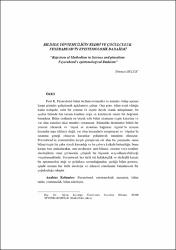| dc.contributor.author | Hülür, Himmet | |
| dc.date | 2015-04-03 | |
| dc.date.accessioned | 2015-04-03T07:30:15Z | |
| dc.date.available | 2015-04-03T07:30:15Z | |
| dc.date.issued | 2006 | |
| dc.identifier.issn | 1302-1265 | |
| dc.identifier.uri | http://hdl.handle.net/11630/3612 | |
| dc.description.abstract | Paul K. Feyerabend bilim tarihini evrenselci ve nesnelci bakış açısına
karşıt görüşler geliştirerek açıklamaya çalışır. Ona göre, bilim ussal olduğu
kadar usdışıdır, sabit bir yöntem ve ölçüte dayalı olarak anlaşılamaz, bu
açıdan bilimde her kuram kendine özgü ve kendisiyle sınırlı bir doğruluk
barındırır. Bilim tarihinde en büyük rolü bilim adamının özgür kararları ve
var olan kuralları ihlal etmeleri oynamıştır. Bilimdeki ilerlemeler belirli bir
yöntem izlenerek ve “dışsal ve insandan bağımsız olgular”la uyuşan
kuramlar inşa edilerek değil, var olan kuramlarla uyuşmayan ve “olgular”la
sınanma gereği olmayan kuramlar geliştirerek mümkün olmuştur.
Feyerabend’in yöntembilim karşıtı görüşlerini ele alan bu çalışmada, onun
bilimi özgür bir çaba olarak kavradığı ve bu çabaya katkıda bulunduğu, buna
karşın bazı muhafazakar, anti-modernist, anti-bilimci, otoriter veya totaliter
ideolojilerin onun görüşlerini çelişkili bir biçimde araçsallaştırabileceği
vurgulanmaktadır. Feyerabend, her türlü tek hakikatçilik ve türdeşlik karşıtı
bir epistemoloji etiği ve politikası savunduğundan, çizdiği bilim portresi,
içinde insanın her türlü ideolojik ve zihinsel yönelimini barındıracak bir
çoğulculuğa sahiptir. | en_US |
| dc.description.abstract | Paul K. Feyerabend attempts to develop a counter perspective to the
universalistic and objectivist viewpoints concerning the history of science.
For him, science has both rational and irrational characteristics, it cannot be
understood through an unchangeable method and standard, in this sense in
science every theory has a truth of it’s own and limited to itself. Rejection of
the prevailing rules and free decision of scientists have played the most
important role in the history of science. The advances in science have been
possible not on the basis of following a certain method and constructing
theories conforming “the outside and independent facts from man”, but on
the basis of developing theories that are not in consistence with the existing
theory and that don’t need to be tested by “the facts”. In this study dealing
with the anti-methodological views of Feyerabend, it is emphasized that
though he conceives science as a free attempt and he contributes to its
freedom, some conservative, anti-modernist, anti-scientist, authoritarian, and
totalitarian ideologies may have paradoxically use his views instrumentally.
Since Feyerabend develops an ethics and politics of epistemology against
every kind of single, uniform and universal truth claims, the portrait of
science drawn by him has a sense of plurality including all kinds of mental
and ideological tendencies of man. | en_US |
| dc.language.iso | tr | |
| dc.publisher | Afyon Kocatepe Üniversitesi | en_US |
| dc.relation.ispartof | Sosyal Bilimler Dergisi | |
| dc.rights | info:eu-repo/semantics/openAccess | en_US |
| dc.subject | Feyerabend | en_US |
| dc.subject | Epistemolojik Anarşizm | en_US |
| dc.subject | Bilim Tarihi | en_US |
| dc.subject | Yöntemcilik | en_US |
| dc.subject | Bilim İdeolojisi | en_US |
| dc.title | Bilimde Yöntemciliğin Reddi ve Çoğulculuk: Feyerabend’in Epistemolojik Dadaizmi | en_US |
| dc.title.alternative | Rejection of Methodism in Science and Pluralism: Feyerabend’s Epistemological Dadaism” | en_US |
| dc.type | Article | |
| dc.department | Afyon Kocatepe Üniversitesi, Sosyoloji Bölümü | en_US |
| dc.identifier.volume | 8 | en_US |
| dc.identifier.startpage | 199 | en_US |
| dc.identifier.endpage | 218 | en_US |
| dc.identifier.issue | 2 | en_US |
| dc.relation.publicationcategory | Makale - Uluslararası Hakemli Dergi - Kurum Yayını | en_US |



















